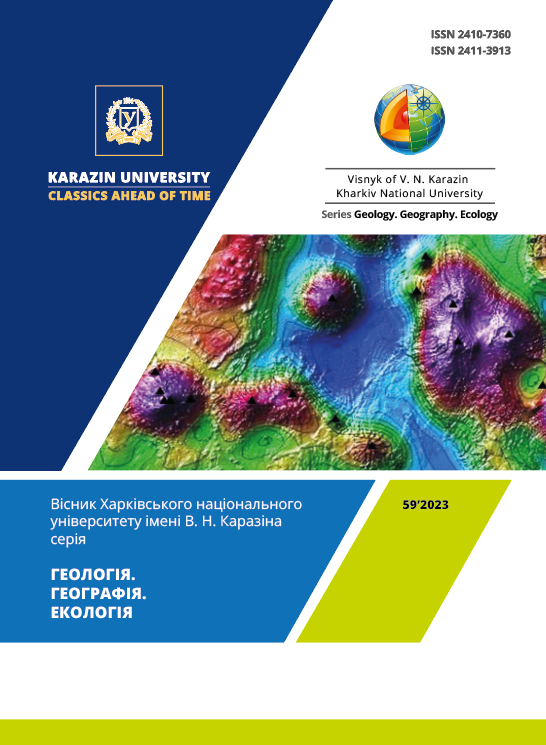Сучасне ландшафтознавство перед викликами Постмодерну
Анотація
Ландшафтознавство сьогоднішнього дня перебуває у стані переходу до нового історичного етапу – епохи Постмодерну. Цей перехід не є «науковою революцією» в розумінні Т. Куна, а спряжений зі змінами більш глибокими, що торкаються самих основ раціонального світосприймання, наукового світопояснення і цілепокладання у сфері наукової діяльності – змінами, котрі мають екзистенціальний і метафізичний характер, пов'язаними з трансформаціями самого історичного процесу у загальнопланетарному масштабі. Вельми актуалізуються напрямки з вивчення таких ландшафтних об’єктів і феноменів, які науковій думці Нового часу, епосі Модерну були методично, епістемологічно, екзистенціально недоступні і ландшафтознавством ХХ ст. здебільшого ігнорувалися (амбівалентні культурні ландшафти, соціально-девастовані ландшафти, антиландшафти, ландшафтоїди та ін.). Глибинні зміни в методології ландшафтознавства, яке вступило в епоху Постмодерну пов’язані також із входженням в науковий дискурс парадоксу, протиріччя, абсурду – як об’єктивної, невід'ємної складової самого ландшафту, так і органічних операторів наукового мислення. Одним з наріжних і вже ясно помітних емпіричних викликів сучасному ландшафтознавству є формування нової – віртуальної – ландшафтної реальності, що створюється штучним інтелектом. У відношенні філософських та методологічних підвалин ландшафтознавство сьогодення стрімко рухається до асиміляції метафізичних і дискурсивних систем, непритаманних новоєвропейському мисленню, але на протязі віків характерних для світопояснювальних системи інших культур людства. Наприклад величезний ландшафтознавчий потенціал має поняття «Марення» корінної австралійської цивілізації аборигенів. Потрібно також позбутися новоєвропейської зверхності по відношенню до способів наукового і квазинауковго світопояснення європейськими дискурсами від античності до 16-го ст. і надати їм рівні методичні й методологічні права у науці Постмодерну, в т.ч. ландшафтознавчій. В цілому, прийдешні зрушення матимуть фундаментальний метафізичний характер, що має примусити людину до кардинального перегляду свого місця і власної ролі в ландшафтній оболонці та в історії.
Завантаження
Посилання
Arshinov, V.I., Svirsky, Ya.I. (2015-2016). The complexity world and its observer. Philosophy of science and technology. 20, 2, 70-84 (part I); 21, 1, 78-91 (part II)
Vladlenova, I.V. (2011). Formation of the NBIC-convergent paradigm. The future of fundamental science: Conceptual, philosophical and social aspects of the problem. M.: Publishing house KRASAND. 99-108.
Grodzinsky, M.D., Savitska, O.V. (2008). Landscape science. Kyiv: Publishing and Printing Center “Kiev University”, 318 [in Ukrainian]
Gusev, Yu.P. (2007). “Cultural landscape” of the twentieth century: “Without fate” by Imre Kertesz. Landscapes of culture. Slavic world. M.: Ed. “Progress-tradition”, 176-188.
Descola, Ph. (2012). Beyond nature and culture: trans. from fr. M.: Publishing house “New Literary Review”, 584.
Drozdov, A.V., Kagansky, V.L., Kolbovsky, E.Yu., Treivish, A.I., Shuper, V.A. (2017). Leitmotifs of geographical research: what are they and do we need them? News of the RAS. 3, 118-128.
Zamyatin, D. (2014). Postgeography. Capital(ism) of geographical images. M.: Publishing house “Humanitarian Academy”, 592.
Kagansky, V.L. (2001). Cultural landscape and Soviet inhabited space. M.: Publishing house “New Literary Review”, 572.
Kruglov, I. (2020). Transdisciplinary geoecology. Lviv: Lviv National University Publishing House, 292. [in Ukrainian]
Lavrenova, O.A. (2021). “The outside of the city”: marginal landscapes and contemporary visual culture. Science of television. 17-2, 88-117.
Lacoue-Labarthe, Ph. (1999). Musica ficta (Wagner's figures): trans. with fr. SPb: “Axiom” Publishing House, Ed. “Azbuka”. 224.
Lyseev, I.K. (2022). Ecological perspective: a radical turn. Cultural and historical dimension of modern science. M., SPb., B.: Ed “Center for Humanitarian Initiatives”, 117-117.
Podoroga, V.A. (2013). Metaphysics of landscape. Communicative strategies in the philosophical culture of the 19th–20th centuries; 2nd ed., revised. and additional. M.: Ed. ROOI “Rehabilitation”. 552.
Priest, G. (2022). Beyond the Limits Thoughts: trans. with English. M.: Ed. "Kanon+"; Publishing House ROOI “Reabilitation”, 456.
Sevalnikov, A.Yu. (2011). Concept of reality and new fundamental science. The future of fundamental science: Conceptual, philosophical and social aspects of the problem. M.: KRASAND Publishing House. 234-247
Smirnov, N.A. (2018). Composition of geocultures of the Arctic: new foundations of geocultural analysis. Geocultures of the Arctic: methodology of analysis and applied research. M.: Publishing house “Canon+"; Ed. ROOI “Rehabilitation”, 38-80.
Sysuev, V.V. (2019). Introduction to the physical and mathematical theory of geosystems. M.: URSS Publishing House. 600.
Tyutyunnik, Yu.G. (2019). Landscape and landscapity. Kyiv: Institute of Evolutionary Ecology of the National Academy of Sciences of Ukraine, 124.
Tyutyunnik Yu.G. (2003). Landscape: etymology, hermeneutics, exegetics. Totallogy-XXI: Post-no-classical studies. Kyiv: Center for Humanitarian Education of the National Academy of Sciences of Ukraine, 10, 54-71.
Tyutyunnik, Yu.G. (2020). On the landscape nature of subjectivity. Questions of philosophy. 3, 194-203.
Tyutyunnik, Yu. (2022). Ruins and landscape. Problems of geography. 3-4, 45-67.
Fucks, R. (2020). Green revolution: Economic growth without damage to the environment: trans. from German. 2nd ed. M.: “Alpina Nonfiction” Publishing House, 330.
Heidegger, M. (1988). European nihilism: translated from German. Problems of man in Western philosophy: translations. M.: Ed. Progress, 261-313.
Khoroshev, A.V. (2014). On the discussion about neolandscapes: determinism, multi-scale, polystructural. Izvestia of the R. Geographical Society. 146, 4, 58-69.
Cherkashin, A.K. (1997). Polysystem analysis and synthesis: Application in geography. N.: Ed. “Nauka”. 502.
Shwebs, G.I. (2000). Introduction to eniogeography. Book 1. Eniogeology. Odessa: Odessa University Publishing House. 256.
Adorno Th.W. (1999). Negative Dialektik. Berlin: Suhrkamp Verlag, 408.
Capra F., Mattei U. (2015). The Ecology of Law: Toward a Legal System in Tune with Nature and Community Hardcover. 1st edition. Oakland: Berrett-Koehler Publishers, 240.
Delgado D.H. (2018). Preguntas cortas… respuestas en context. Boletín OPCA (Observatorio del Patrimonio Cultural y Arqueológico). 4, 18-28.
Dillon B. (2011). Ruin Lust. Cambridge: MIT Press, 240.
Lyotard J.-F. (1979). La condition postmoderne: rapport sur le savoir. Paris: Éditions de Minuit, 128.
Maiz T. (2002). El Pais Vasco como paisaje industrial. Fabrikart. 2, 170-185.

Цю роботу ліцензовано за Міжнародня ліцензія Creative Commons Attribution 4.0.





